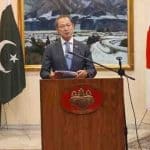ISLAMABAD, Aug 02 (APP): The Supreme Court on Wednesday rejected the plea for the formation of a full court bench to hear cases against the trial of civilian accused by military courts.
The six-member bench headed by the CJP and comprising Justice Ijaz ul Ahsan, Justice Munib Akhtar, Justice Yahya Afridi, Justice Mazahar Ali Naqvi and Justice Ayesha Malik heard the case.
During the course of hearing, Attorney General for Pakistan Mansoor Usman Awan said three points were raised by lawyer Faisal Siddiqui in his application. He had given some assurances to the court regarding the trial of the accused, provision of basic facilities, hiring private lawyers and meeting of the accused with their families, he added.
He said he had also given an assurance pertaining to recording of the evidence and including the reasons in the judgments. He had personally monitored the situation of 102 arrested accused and none of them was in bad condition, he added.
CJP Bandial rejected the request for the full court bench, saying that they would start from the point where the arguments stopped.
He observed that what was happening now was being witnessed by everyone. The court would continue its proceedings and work whether anyone liked it or not.
“The people will decide which law will work in the country. Whether we did the job right or not, we leave it to history. We don’t care for criticism,” he added.
Justice Ayesha Malik remarked that how they would differentiate the jurisdictions of the judiciary and the legislature regarding the military courts. The separation of powers of the judiciary and the executive was also an important point, she said.
The AGP said that the scope of court martial had been separated, and he would cite several verdicts, including that of the Liaquat Hussain case. The military courts were constituted under the law but were exempted from Article 175 of the Constitution. The court martial proceedings did not come fall under Article 175, he said, adding he would answer the questions of the court.
Justice Munib Akhtar said in such case the question arose whether the petitioners’ arguments were not valid. The petitioners were of the view that the civilians had fundamental rights, he added.
The AGP said that the fundamental rights would be seen by the courts established under Article 175. The military courts were established according to the law and high courts were approached against them under Article 199(5) of the Constitution.
He said in many institutions, including Finance Department and Federal Board of Revenue, decisions were made by administrative officers and appeals were heard by superior officers. Such matters then came to the high courts, he added.
Justice Munib Akhtar remarked that no one was sentenced to death or awarded imprisonment by an administrative tribunal. How any citizen could be deprived of basic rights, he questioned. The extent of army discipline was different, he remarked, adding that even death sentence to an army officer could not be pronounced without a transparent trial. Army personnel and officers were also citizens of the country, he added.
The court then adjourned the case.
Follow the PNI Facebook page for the latest news and updates.









